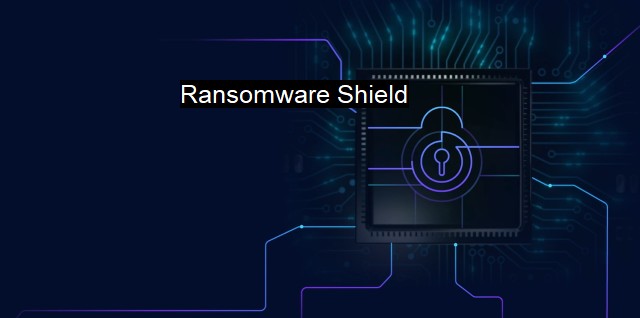What is Ransomware Shield?
Protecting Against Ransomware Threats with Antivirus Software’s Integrated Ransomware Shield: Essential Functions and Features Explained
Ransomware Shield is an innovative security feature found in cybersecurity solutions, particularly in antivirus software. This feature is specifically designed to combat ransomware attacks, a form of menacing cyber threat that encrypts vital data or locks users out of their systems until a ransom is paid to the hackers. In today's world where cyber threats are rapidly growing in complexity and scale, having an efficient and reliable security tool like the Ransomware Shield becomes critical.Ransomware is a form of malicious software that infiltrates computer systems, and upon activation, blocks user access to the system or data until a specific sum of money is paid. Those targeted by these attacks are granted limited time to pay the ransom, usually demanded in non-traceable digital currencies like Bitcoin. These attacks prey not only on individuals but are also hazardous to businesses, often crippling routine operations, and causing immense financial loss and damage to the organization's reputation.
In this context, the Ransomware Shield serves as an antivirus feature that identifies and blocks ransomware threats before they can impact users' devices. It operates based on a real-time threat detection mechanism, which is continuously updated with the newest threat definitions to ensure protection even against the latest strains of ransomware.
Once active, the Ransomware Shield monitors all activities on your computer, watching for signs of ransomware infection. These signatures might include unusual encryption activity or attempts to delete or modify backups. On identifying such activities, it swiftly alerts the user and takes the necessary countermeasures to neutralize the threat, providing an early warning system and prevention mechanism against ransomware attacks.
Some Ransomware Shields also include the feature of 'ransomware quarantine.' In this quarantine state, suspected files are isolated from the system to prevent the spread of infection. Advanced versions of antivirus software also offer the system restore option where the system is rolled back to its safe state, negating the effect of the ransomware.
Ransomware Shield constantly learns malwares' evolving tactics. Using a blend of heuristic and behavioral analysis coupled with artificial intelligence, Ransomware Shields adapt to evolving threats. This learning capacity, complemented by a massive global threat intelligence network, makes it increasingly effective against the mutating patterns of ransomware attacks.
Certain Ransomware Shield, employs whitelist method, where known safe programs are given permission to access the data. This preventative approach assists the Ransomware Shield in thwarting any unrecognized software that attempts to tamper with personal data. If a program not on the whitelist tries to alter a protected file or folder, Ransomware Shield blocks it and sends out an alert.
Compared to traditional antiviruses that rely on signature-based detection and are limited to detecting known threats, Ransomware Shield's advanced mechanisms make it possible to spot and tackle unknown 'zero-day' threats, thus providing a more comprehensive security solution.
Besides adding an extra layer of security, Ransomware Shield bolsters the users' data defense system. It allows the users to protect selected folders deemed critical by preventing programs from modifying files in these folders. This way, zero-day ransomware that has slipped through the antivirus' defense is kept away from important files.
In spite of implementing advanced countermeasures against ransomware, cybersecurity experts advise practicing cyberspace hygiene along with using Ransomware Shields. Regular system backups, minimal exposure to suspicious sites or links, using updated security patches can enhance the effectiveness of a Ransomware Shield, ensuring comprehensive protection against ransomware.
Adopting Ransomware Shield in antivirus utilities has revolutionized the war against cyber threats such as ransomware. While it isn't completely foolproof—no security system truly is—the Ransomware Shield greatly minimizes potential vulnerabilities in systems, empowering both individuals and organizations with enhanced cybersecurity mechanisms to safeguard against the growing menace of ransomware attacks.

Ransomware Shield FAQs
What is ransomware shield?
Ransomware shield is a cybersecurity feature that protects your computer from ransomware attacks. It is a part of antivirus software that monitors your system for any unusual activity and prevents the execution of malicious files.How does ransomware shield work?
Ransomware shield works by detecting the behavior of the ransomware process and stopping it before it can encrypt your files. It uses heuristics and machine learning to identify the pattern of ransomware attacks and blocks them in real-time.Is ransomware shield effective against all types of ransomware attacks?
Ransomware shield is designed to protect your computer from most types of ransomware attacks. However, it does not guarantee 100% protection as new forms of ransomware are constantly being developed. It is important to keep your antivirus software updated and practice safe browsing habits to minimize the risk of ransomware attacks.Can I use ransomware shield as a standalone software?
No, ransomware shield is a feature within antivirus software. It cannot be used as a standalone software. It is important to have a reliable antivirus software installed on your computer that includes ransomware shield to provide comprehensive protection against cyber threats.| | A | | | B | | | C | | | D | | | E | | | F | | | G | | | H | | | I | | | J | | | K | | | L | | | M | |
| | N | | | O | | | P | | | Q | | | R | | | S | | | T | | | U | | | V | | | W | | | X | | | Y | | | Z | |
| | 1 | | | 2 | | | 3 | | | 4 | | | 7 | | | 8 | | |||||||